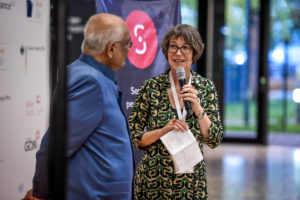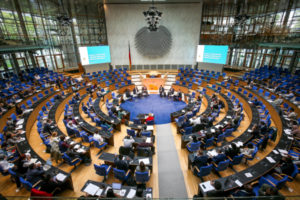The Global Development Network (GDN) celebrated the network’s 20th anniversary with a conference in Bonn from 23 to 25 October 2019. Under the motto “Knowledge for Sustainable Development: The Research-Policy NexusKnowledge for Sustainable Development: The Research-Policy Nexus”, development practitioners and academics were invited to the World Conference Center Bonn. – The German Development Institute / Deutsches Institut für Entwicklungspolitik (DIE) and other institutions were co-hosts of this conference.
The GDN conference’s focus on the research-policy interface in pursuit of the 2030 Agenda resonated well with DIE’s work on knowledge cooperation and the institute’s work on policy advice for sustainable development. In different sessions, panelists and participants highlighted that thinking beyond silos is necessary to tackle problems as complex as those defined in the Sustainable Development Goals (SDGs). A special characteristic of GDN’s conferences is the broad participation of researchers and practitioners from countries of the Global South, thus providing a platform for open discussions concerning different perspectives on what constitutes relevant knowledge for sustainable development.

The conference focussed on four interrelated themes, which were addressed in plenary sessions and in smaller parallel workshops and panels. They were: interdisciplinary research and knowledge sharing, challenges of sustainable development, digital transformation and personal responsibility as well as sustainability in research.
DIE’s acting director Imme Scholz chaired the opening plenary, which asked the question how far we have come from research to action for sustainable development. The panel highlighted the need for openness towards new concepts of development, diversity of methods and disciplinary approaches and the freedom to ask difficult questions and express divergent views. On day 2, Imme Scholz also participated in the launch of Southern Voice’s Report on the ‘State of the Sustainable Development Goals’ with Southern Voice’s Chair Debapriya Bhattacharya.
The conference sought approaches that improve the relationship between researchers and policy-makers as well as the wider society. In a panel organised by the European Association of Development Research and Training Institutes (EADI), chaired by Sven Grimm, head of the programme “Inter- and Transnational Cooperation with the Global South” at DIE, participants discussed the respective roles of policy makers, researchers and civil society and highlighted ethical considerations. While policy-making works to balance out diverse societal interests, research generates evidence on the benefits and costs related to such compromises which in turn might also contribute to tensions. In some settings, researchers consult closely with decision-makers to address issues and engage in transformative research; in others, researchers opt for a more distanced approach. The involvement of state and societal actors in the research process always requires a continuous clarification of roles and a reflection on ethical questions.

The latter was also the topic for a side event on ethics in development research, organised by Lennart Kaplan and Jana Kuhnt of DIE. They invited the conference participants to discuss “Ethics in development research: Doing no harm to research staff when conducting research in developing countries”. The event highlighted the thin line between helping and harming on which researchers must walk when conducting field research in developing countries. Their systematic literature review on the subject highlighted that researchers need to reflect these questions when preparing for field research, and to be aware of the fact that some situations are hard to prepare for. Find out more about DIE’s research on that topic by taking a look at this related project.
On day two, DIE’s panel on transnational knowledge cooperation for global sustainable development, chaired by Anna Schwachula, returned to the conference theme of knowledge sharing. Panelists were invited to discuss the real-life implications of terms such as “co-production of knowledge” or “eye-level cooperation” from their different perspectives. Paulo Esteves (BRICS Policy Centre, Brazil), highlighted the challenges of cooperation between partners of diverse backgrounds and disciplines, both in the context of North-South as well as South-South Cooperation and how they are exacerbated by governments that question human rights and democratic principles and rules . Citlali Ayala (Instituto Mora, Mexico) presented ten principles of joint knowledge production that enable global cooperation networks to deal with global challenges. Julia Schöneberg (University of Kassel) then showed how post-colonial power issues (such as epistemic dominance) persist in knowledge networks. Along the example of the MGG network, DIE’s Johanna Vogel illustrated how knowledge networks make a difference.
Another DIE presentation focussed on the effects of environmental provisions in preferential trade agreements. Over the last couple of years, DIE has been using a comprehensive dataset developed by Jean-Frédéric Morin to create the TREND analytics tool, which tracks more than 300 different environmental clauses in about 630 preferential trade agreements signed since 1945. In his presentation of the research DIE’s Axel Berger highlighted the positive effect these kinds of provisions can have on sustainability issues like pollution and the fostering of green production and exports.
On the last day of the conference, DIE’s Daniele Malerba met with colleagues from other institutes to discuss the implementation of the SDGs in countries of the Global South. This session was also organised by EADI.
Throughout the three days of the conference, DIE also presented its work on Managing Global Governance in a variety of policy fields, including sustainability standards, digitalisation how training by national schools of public administration contributes to implementing the 2030 Agenda, and many more at a dedicated booth, drawing a large audience of development experts from the Global North and South. Many connections were made. We will follow up on as many as possible, to further improve the research-policy nexus for sustainable development around the world.
The conference was co-organised by the GDN, DIE, the German Institute for Development Evaluation (Deval), the Bonn Alliance for Sustainability Research and the Institute for Environment and Human Security of the United Nations University in Bonn. The conference was held under the auspices of the German Federal Ministry for Economic Cooperation and Development (BMZ) and supported by the German Federal Foreign Office and the Sparkassenstiftung für internationale Kooperation.

Schreibe einen Kommentar